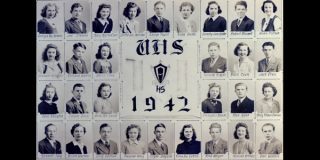February 1, 2011

Jack Cross, second row, far right, was the son of Charles Cross, longtime director of the training school at the University of Arkansas.
Many children who attended the training school operated at the University of Arkansas could say their parents were nearby because they taught on campus, but Jack Cross’ dad was very close. Charles Cross was the director of the training school.
Peabody Hall Restoration
Moves Forward
Peabody Hall was the first building on the Fayetteville campus financed with private funds. The university constructed the three-story building in 1913 with a contribution of $40,000 from the Peabody Education Fund. The building was the site of Peabody Elementary School and University High School for more than 50 years, during which time children of faculty and staff members as well as other children from around the state were educated in a public school setting.
The high school closed in 1962 and the elementary school closed in 1966, although a small kindergarten was maintained until the early 1980s. University students in the education program now complete internships off campus, teaching in local public schools.
Peabody Hall is now closed temporarily for a restoration project that is expected to be complete in the fall of 2011.
The then-College of Education operated University High School and Peabody Elementary School in Peabody Hall on the Fayetteville campus for more than 50 years. The college charged with training teachers, now called the College of Education and Health Professions, ran the school largely as a way to provide student teaching experiences for the education students. Peabody Hall, constructed in 1913, is temporarily closed for restoration. The elementary school was on the first floor and the high school on the second and third floors of the building, Cross said.
Cross, who now lives in Denton, Texas, grew up in Fayetteville with his parents and younger brother. He attended Peabody Elementary from first through sixth grade, attended Fayetteville Public Schools for seventh and eighth grades and then returned to University High School, graduating in 1942.
“My dad was principal of the lab school, as we called it,” Jack Cross said. His father also held an appointment as associate dean of the College of Education. “I don’t know why I didn’t stay at the school for seventh and eighth grades. I don’t know if he wanted us to get experience at other schools. The training school was more like a private school. Quite a number of faculty members’ children attended. There was the dean of arts and sciences’ two daughters and one son and a philosophy professor’s twin boys. Most of us were college brats.
“It was great to have university students and regular faculty members for our teachers,” Cross continued. “I took Latin for two years. The student teachers were supervised by regular teachers with public school experience and by faculty at the university. ”
He remembered one of the Arkansas football players helping with physical education classes and members of the university’s ROTC program starting a rifle squad in the high school.
“The junior and senior boys in the high school had wooden rifles and we marched on what was our playground in front of Carnall Hall,” Cross said.
When the weather was bad, the students walked to the men’s gymnasium for recess, but they got wet and cold getting there so that seemed to defeat the purpose of playing inside, he laughed.
“We took industrial arts in the shops the university students used and had music in the band building and typing in the business building,” Cross said. “There was a wide variety of activities. We could buy Cokes at the Student Union (in what is now Memorial Hall). New students at the university would stop us and ask us why we weren’t in school, but after a while they became familiar with us and we were no longer a novelty.”
Training school students did get into a bit of trouble on campus occasionally, Cross said, as he recalled getting caught out on a fire escape on Old Main.
“Since my dad was the principal, it was extra hard for me to keep from getting noticed,” he said. “Mostly, we just got a talking-to.”
Cross said students sometimes were disciplined for talking or passing notes in class but he didn’t remember fights among students.
“At the beginning of the semester, Dad would get all the high school kids together on the top floor and have a give-and-take session about how we should treat each other the same even if we came from different places,” Cross said. “You could tell where a kid was from by what they wore. Most of the farm kids were in bib overalls. It wasn’t really that we were special, but we understood that it was special for us to be on a university campus, which most kids don’t experience at that age, and that the university faculty members commanded respect.”
Even as son of the director of the school, Cross and his brother walked to Old Main with their classmates to pay their fees every semester.
“We would walk over by grade level and pay it ourselves,” he said. “It was a different area in the building from where the university students paid their fees.”
Cross said his first significant experience with traditional public schools was as a teacher himself when he earned his certification and went to work in Shreveport, La. He had earned a bachelor’s degree in science from the University of Arkansas, during which he was interrupted by his military service, and then returned again to earn a master’s degree in 1949. He worked on his doctorate in education during the summers.
Cross is retired after 44 years as a teacher and administrator.
“I spent nearly all of my educational years on the University of Arkansas campus,” he said. “I’m looking forward to coming back and seeing Peabody Hall again.”

